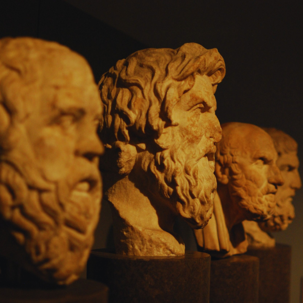Today’s law students will probably meet professors who will tell them that they were first inspired to become criminal defense lawyers when they read To Kill a Mockingbird and that the character of Atticus Finch represents the most important task of criminal defense lawyers, namely to help people accused of crimes exercise their rights by advancing defenses and attempting to show that there is enough doubt about their guilt not to convict them. Of course, the book is set in the 1930s, nearly a century ago. Today, criminal trials are quite different because juries base their decisions on screenshots and DNA evidence, not simply on whether the prosecutions’ witnesses have a reputation for honesty or lack thereof. The principles of law and criminal procedure have endured for centuries; you might even find law professors who claim role models from an even earlier time period. If you want inspiration for doing what criminal defense lawyers do, you could choose a worse role model than Aristotle.
Although if you are accused of a crime, your goal is to avoid getting a prison sentence, where you have years to ponder which role models you should have chosen, right now, you need a Texas criminal defense lawyer.
The Four Classical Modes of Rhetoric Are a Winning Strategy in the Courtroom
When criminal defense lawyers present their cases to juries today, they are engaging in the same four classical modes of rhetoric that Aristotle described more than 2,000 years ago. The four modes of rhetoric are Kairos, ethos, logos, and pathos. The first two are a slam dunk at a criminal trial. Kairos is choosing the right moment to deliver your effective speech, and a trial is the perfect setting to deliver an argument in defense of someone facing criminal charges. Ethos is the speaker’s reputation, and lawyers and expert witnesses have an ethos in spades.
The other two modes of rhetoric rely more on the lawyer’s skill in the moment. Logos is where the lawyer crafts a logical argument. It is the cornerstone of a successful defense; without it, the other modes of rhetoric are just for decoration. Your lawyer must look at the evidence the court has decided to admit and, if applicable, persuade the court to include or exclude certain pieces of evidence. Then, the lawyer must make the evidence tell a story. Ideally, the lawyer does not directly tell the jury the resolution of the story but rather lets them figure it out for themselves. Finally, pathos is an appeal to emotion, but that does not always mean that the lawyer and witnesses should give an emotional performance in the courtroom. Harnessing pathos is more about finding out how the jurors think and feel, which your lawyer will do during jury selection.
Contact the Law Office of Patrick J. McLain, PLLC, About Criminal Defense Cases
A Dallas criminal defense lawyer can help you fight your charges by using the four modes of rhetoric to build a compelling defense case. Contact the Law Office of Patrick J. McLain, PLLC.

